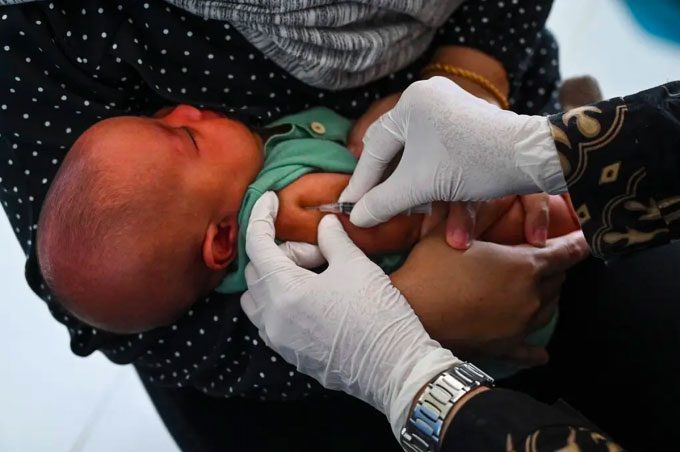The BCG vaccine for tuberculosis may combat Covid-19 and other infectious diseases by boosting the immune system.
In the early stages of the Covid-19 pandemic, when vaccination was still a distant dream, some scientists experimented to see if the old tuberculosis vaccine, developed since the 1990s, could protect people.
The vaccine, known as Bacillus Calmette-Guérin (BCG), has long been proven to have a broad impact on the immune system and can be administered to infants in developing countries where tuberculosis remains prevalent.
Years ago, experts noticed that this vaccine seemed to train the immune system to respond to various infectious pathogens, including viruses, bacteria, and parasites, thereby reducing mortality rates among newborns.
As new pathogens like monkeypox emerged, old viruses like polio reappeared, and Covid-19 continued to evolve, scientists remained interested in the BCG vaccine, aiming to provide general protection against known infectious pathogens.
The latest research results come from a trial that began before the Covid-19 pandemic, published in the Cell Reports on July 15. The goal was to investigate whether the BCG vaccine would be beneficial for individuals with type 1 diabetes, who are highly susceptible to infections.
In January 2020, when the pandemic broke out, experts monitored Covid-19 infections among 144 participants in the trial. All had type 1 diabetes, with two-thirds having received at least three doses of BCG before the pandemic. The remaining third received multiple doses of a placebo.
The results indicated that only about 1% of the 96 individuals who received the BCG vaccine contracted Covid-19, compared to 12.5% of the 48 individuals who received the placebo.
Dr. Denise Faustman, director of the immunobiology department at Massachusetts General Hospital in the U.S. and the lead author of the study, stated that although the trial was relatively small, “the results are still remarkable, comparable to the Moderna and Pfizer vaccines.”
“We also observed that the vaccine significantly reduced the risk of bladder infections, influenza, colds, and respiratory infections in diabetic patients,” she added.
According to her, the vaccine seems to have reset the overall immune response of the host, making it more alert and responsive.

A boy in Banda Aceh, Indonesia, receiving the BCG vaccine against tuberculosis. (Photo: AFP)
Another trial of BCG in 300 elderly individuals in Greece showed that the vaccine reduced the number of Covid-19 infections by two-thirds and decreased the incidence of other respiratory infections.
According to research published in the journal Frontiers in July, only two vaccinated individuals required hospitalization after contracting Covid-19.
“We observed a significant immune effect from the BCG vaccine. We find it intriguing to ask whether BCG and other vaccines that train the immune system could defend against future emerging pathogens that are not yet known,” said Professor Mihai Netea from Radboud University Medical Center in the Netherlands, a co-author of the report.
He noted that the results of the trial on type 1 diabetes patients were “very convincing,” but also cautioned that experts should be cautious, pointing out that other trials yielded less favorable results. A study in the Netherlands involving about 1,500 healthcare workers showed that the BCG vaccine did not reduce infection rates. Another study involving 1,000 healthcare workers in South Africa found that BCG did not lessen the severity of infections.
The largest trial of BCG, taking place in Australia, the UK, Spain, and Brazil over one year, is still ongoing and has not yet reported results.
“The BCG vaccine remains a controversial area, with some believing and others doubting its effectiveness. Everyone acknowledges its off-target effects, but how significant they are and whether they are clinically useful, whether it is only for infants or can also be used for immunocompromised individuals, are still major questions,” said Nigel Curtis, a professor of pediatric infectious diseases at the University of Melbourne and the principal investigator of the study.
Scientists have proposed several reasons why the BCG vaccine may be effective against various infectious diseases. The vaccine contains a live, attenuated strain of bacteria that has been cultured in laboratories around the world for decades, resulting in various mutations.
Dr. Faustman’s lab uses the Tokyo strain of Mycobacterium bovis, considered particularly potent. Meanwhile, Dr. Curtis uses the Danish strain, which is the most common. The number of BCG doses may also influence immune response, as many vaccines require booster shots to maximize protection.
Dr. Faustman’s research indicates that the vaccine needs time to reach its full effect. The type 1 diabetes patients received several doses of BCG before the pandemic, which is why the vaccine was effective when Covid-19 arrived.
Scientists hope that BCG could become a universal vaccine against multiple pathogens. Now, experts are no longer focused on preventing Covid-19, as existing vaccines are highly effective.
Instead, they aim to develop tools for use in the next pandemic, which could be a vaccine against coronaviruses in general, a new deadly strain of influenza, or an unidentified pathogen.


















































